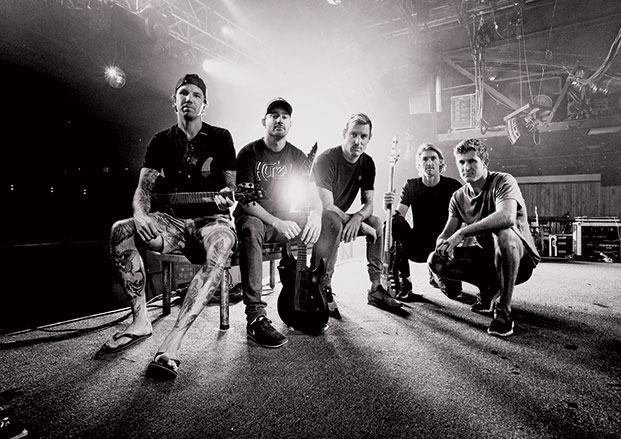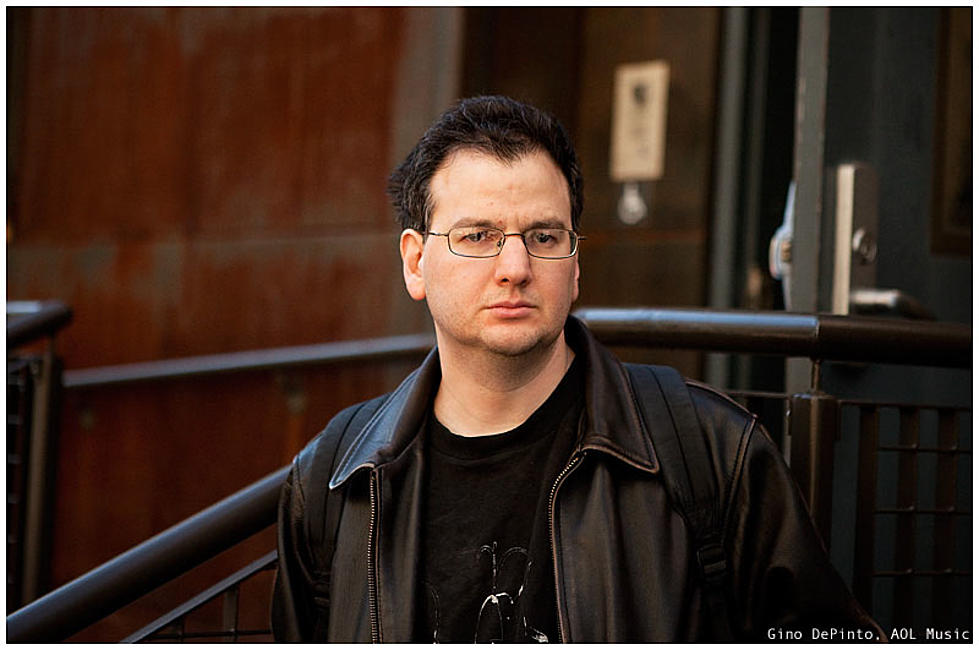Parkway Drive Discusses New Album, 'Ire,' Humble Beginnings
All the latest guitar news, interviews, lessons, reviews, deals and more, direct to your inbox!
You are now subscribed
Your newsletter sign-up was successful

On a sunny day in September 2015, about two weeks before Parkway Drive were scheduled to launch an Australian tour for their fifth album, Ire, guitarist Jeff Ling took his surfboard out to a beach in his hometown of Byron Bay in New South Wales.
He paddled out into the water and waited for a good wave. When one approached he clambered onto his board and caught the barrel of the wave, riding it as it built in height and strength. As it started to crest, he shifted his weight and his left foot slid toward the back of the board. He tried to catch his balance by moving his right foot slightly forward, and to his dismay, his legs spread like a high school cheerleader doing the splits.
“It put a lot of pressure on the leg and it set my hamstring off like a shotgun,” Ling says backstage before a show in Louisville, Kentucky. “I felt this blinding pain all up my leg and I fell off my board. I had to hop all the way up to the car park, and then I went to the hospital.”
Ling was diagnosed with two ruptured tendons and a torn ligament in his hamstring. Doctors used metal screws to reattach the ligament to his “butt bone.” Though the operation was a success, the guitarist was still in a wheelchair at the end of the month when Parkway Drive started touring. Since he couldn’t walk, let alone leap from amp stacks, he played his ESP E-II JLM-II signature guitar sitting in a wheelchair, and used his uninjured leg to kick himself back and forth across the stage.
“You’d think you’d be pretty immobile in that state, but you can move around quite a bit,” says rhythm guitarist Luke “Pig” Kilpatrick, who plays his own ESP E-II signature. “It’s actually more fun to play in a wheelchair than standing up on the stage.”
Kilpatrick would know. Four years ago he was surfing not far from where Ling took a tumble when his board snapped, fracturing his tibia in two places when he tumbled into the water. One quick leg cast later and the guitarist was wheelchair-bound for two tours.
With the exception of surf accidents, being from Byron Bay has been surprisingly advantageous for Parkway Drive, allowing them to develop at their own rapid pace, far from the rest of the scene. As a result, Ling, Kilpatrick, vocalist Winston McCall, drummer Ben “Gaz” Gordon and bassist Jia “Pie” O’Connor (the only non-original member) learned to play galloping, roaring metalcore without resorting to an illegible logo or sadistic moniker; Parkway Drive is the name of the road where their first rehearsal space was located.
All the latest guitar news, interviews, lessons, reviews, deals and more, direct to your inbox!
“When I was 11, I loved heavy music, but I could never understand why everyone else who liked the same bands had long hair, wore black and had these huge boots,” Kilpatrick explains. “I just wanted to look like I always have, but I also wanted to play heavy music.”
“We’re all happy being ourselves, wearing surf shorts or whatever,” agrees Ling. “So right away, we didn’t seem like all these other bands with some shit-brutal name and a dress code. And maybe kids could relate to that.”
From their formation in 2003 until their fourth album Atlas nine years later, Parkway Drive steadily improved as musicians and songwriters. Each release was more diverse and better crafted than the last. The riffs and leads were more original and the breakdowns were placed with more tact than that exhibited by most of Parkway Drive’s peers. With each step, the band’s fan base grew.
By mid-2010 all three of the group’s records were Gold in Australia, and in 2012 Atlas debuted at Number 32 on the Billboard album chart. Parkway Drive supported the release in the U.S., headlining above Miss May I, The Word Alive and Veil of Maya, and they were a highlight of 2014’s Warped Tour.
Shortly after they started touring for Atlas, Parkway Drive started writing the album that would become Ire. During the next three years they grew dramatically from a solid metalcore band to a musically eclectic outfit, alternately influenced by Metallica, Iron Maiden, Faith No More and Avenged Sevenfold.
“We have always listened to very varied music, but for some reason we just stuck to the same formula of writing we had when we first started the band,” says McCall. “It was comfortable because that’s all we really knew. And we had a specific sound that people liked. But after 12 years of doing that, we got bored and wanted to try something different.”
With Ling at the forefront, Parkway Drive abandoned most of the breakdowns they had clung to like life rafts, and replaced them with a variety of music styles and metal techniques, from euphoric anthems to seething staccato thrash.
“I looked at this album as a real test of my musicianship,” Ling says. “I wanted to take it as far as I possibly could and it pretty much drove me crazy by the end because I kept second-guessing myself. But I wanted to push the boundaries of what I could do.”
Nowhere is this more evident than on the first single “Vice Grip,” which couples sustained commercial-sounding rock chords with tuneful guitar licks, and ties them together with a fist-pumping chorus, replete with, “Yeah, yeah, yeah!” vocal chants. The song was a watershed moment, inspiring the band to experiment with the Middle Eastern hooks of “Crushed,” the mystical Indian melodies of “Vicious,” the violin and piano embellishments of “Writings on the Wall” and the classical guitar of “A Deathless Song.” But when Parkway Drive started writing “Vice Grip” the song was as fast and pounding as anything from Atlas.
- “At the very beginning, it was more of a traditional hardcore Parkway song,” Ling says. “I just kept modifying and changing and tweaking it because every time I did that I thought it was moving in a better direction. From start to finish, it took two years to properly sign off on that song. But once that happened, it felt like I had broken through and there were no longer any limitations.”
- “At one point we were debating whether or not to put out ‘Vice Grip’ as the first single because it was so different for us,” says Kilpatrick. “In the past we wouldn’t have had the guts to do it, but this time it made sense because it was in line with our whole approach for the album. And now it’s the biggest song in our set.”
The unconventional evolution of “Vice Grip” is emblematic of Parkway Drive’s career. Seemingly unwise and odd moves have repeatedly paid off, including intentionally booking shows in prime surf locations, touring the world before an international record deal was in place and hiring the band’s virtually unknown front-of-house sound guy to produce Ire. In part, the atypical business decisions have stemmed from Parkway Drive’s development outside of music industry central. Since they didn’t know the rules from the start, they didn’t have to follow them, and whenever they encountered problems they concocted their own solution.
Byron Bay, where everyone in the band grew up, has a population of 5,000 and in the 80's and 90's the town had no music scene and zero rock radio stations. The guys in Parkway Drive didn’t discover metal until they heard it used as background music on surf videos they watched as kids. Ling was the first to pick up a guitar, but while he started dabbling at age eight, he only took lessons for two years, between the ages of 15 and 17.
“I wish I took more lessons when I was younger,” he says. “If I was trained better, I’d know what key I was playing in and what scale to solo in instead of just figuring out everything by ear and playing whatever sounds good to me.”
Though Ling taught himself to play, he practiced for hours a day from a young age, so by the time he hit intermediate school he was on his way to becoming an accomplished shredder.
By contrast, Kilpatrick, who still can’t play a minor pentatonic scale, picked up guitar when he was 14 after he saw a friend playing hardcore and punk songs. He took lessons for a few months, just long enough to learn how to play power chords, then quit formal instruction and started a hardcore band. Around the same time, McCall and Gordon formed the group Think Straight with other players who didn’t work out. When Kilpatrick’s band broke up, Gordon invited him to join. At first, McCall was reluctant to play with the sloppy guitarist.
“I didn’t care that he couldn’t play, I just hated him because he was an asshole,” McCall reveals. “He still is. But he was one of the ‘cool kids’ and he made fun of me because, at that point in time, I wasn’t living directly in town. I was about 10 minutes away and I wasn’t in the popular surfing gang.”
McCall let go of his grudge, and the revamped Think Straight played local shows for a couple dozen kids, including, unbeknownst to them, Ling. Though McCall and Gordon were psyched about the attention, they were frustrated by their musical limitations and decided they needed a better songwriter and player. That’s when Gordon recalled a guy who used to live next door, who was two years older than him, but could play lead guitar. Since all the kids went to the same intermediate school it didn’t take long for them to track down Ling and ask him to join.
“I honestly never had any intention of playing in a band,” Ling says. “I started playing because I enjoyed it. The whole concept of being in a band didn’t even hit home. But then I thought, Okay, I’ll give it a shot, and I wound up loving it.”
In early 2003, when everyone but Ling was in his mid-teens, Think Straight changed their name to Parkway Drive, wrote a batch of raw, screamy tunes filled with breakdowns and self-indulgent solos and booked their first show at the Byron Bay Youth Center. Coincidentally, I Killed the Prom Queen’s vocalist, Michael Crafter, was in town from Adelaide to visit his girlfriend the night of the gig and decided to check it out.
“It was horrible,” Ling recalls. “I was terrified. I won’t pretend I was cool. I had never played in front of people and I never thought about what it would be like. I was onstage wearing board shorts and my socks pulled up. I was just clueless and I don’t really think we played well.”
Crafter disagreed, and invited Parkway Drive to record a split single with I Killed the Prom Queen, which had already recorded an EP and an album and were considered rock royalty in small-town Australia. In May 2003 the I Killed the Prom Queen/Parkway Drive split EP came out. The two bands played shows in Australia and when Parkway returned home Prom Queen’s label Resist offered the band a domestic deal. In 2004, Parkway Drive released the cleaner, but equally hyperactive, Don’t Close Your Eyes EP, and the next year they did what none of their country mates had done. They sent their EP to Killswitch Engage guitarist and producer Adam Dutkiewicz and asked if he would produce their debut album. When he agreed, they flew to Western Massachusetts and spent two weeks recording Killing with a Smile at Zing Studios. To minimize expenses, Parkway Drive tracked the album in a mere two weeks, then flew straight back home.
While the record sounded like Killswitch with far more breakdowns, it was well-received in Australia. But Parkway Drive couldn’t find a label to release it in Europe or the U.S. So the members borrowed money from their parents and flew to Europe on their own. They booked their own shows; when they were lucky, they opened gigs for local bands and played to a handful of cross-armed audience members. Then they piled into their rented van and drove for hours to another, more remote location. To save hotel costs they pulled off the road when they were tired and crashed outdoors.
“We couldn’t see the sense in paying $100 a night to sleep when it was beautiful outside and we all had sleeping bags,” says Kilpatrick. “Once in England we woke in the morning on a farm surrounded by cow shit.”
“Also, having mosquitos biting your face up all night isn’t especially pleasant,” adds Ling. “And, untimely, sprinklers going off in yards aren’t real fun either. But we did what we had to do.”
In 2007, Parkway Drive returned to Zing Studios to work with Dutkiewicz on their second album Horizons, which was picked up in the U.S. by Epitaph, making Parkway the only metalcore band on the label. The group scheduled its first U.S. tour, applying their well-worn overnight regimen with slightly less success. Sometimes they were woken up and shooed away like homeless men. A couple incidents even involved local authorities.
“We’d parked our van in various neighborhoods and just crash there,” Kilpatrick explains. “That tended to freak out the people who lived there because they saw this random van parked near their house. They thought we were terrorists and called the police.”
When Parkway Drive got home from their Horizons tour they started writing 2010’s Deep Blue, which was produced by Joe Barresi (Bad Religion, Coheed and Cambria) and debuted at Number 39 on the Billboard album chart. By the end of the tour cycle, Parkway Drive were making enough money to tour in a bus. Since then, they’ve traveled in relative comfort and played sensible itineraries booked by professionals. Of course, that hasn’t exactly curbed their shenanigans. They’ve leapt from high cliffs into the water, bungee jumped off bridges and engaged in mid-drive piss bottle battles.
A few days before talking to Guitar World, Parkway Drive were playing a venue in Charleston, South Carolina, that didn’t have showers. So they got creative. “We showered under a fire hydrant in the middle of a parking structure and got yelled at by the police,” McCall says. “They told us it’s not a third world country and we’re not allowed to do that. They came running over so we scrambled back into the bus and drove away. Fortunately, they didn’t try to follow us.”
Such behavior is somewhat surprising coming from men in their thirties who have a decade of touring experience. And Parkway Drive can’t blame their stupid antics on drugs or alcohol since none of the members drink at home and they only partake in moderation on tour.
“We’re just active people who like surfing every day,” Kilpatrick shrugs. “When you grow up by the beach you always have that drive to do something physical. So staying up late and drinking and getting smashed isn’t fun for us. We’d rather act stupid and have a laugh with clear heads.”
“We don’t take ourselves seriously, but we take our music very seriously,” Ling explains. “If you sit around at a venue drinking all day you’re not going to perform well. I think a lot of bands have a really narrow way of looking at touring. They have this mentality where they go, ‘Oh, I’m stuck here in the club until we go on. I’m bored shitless so I’m going to get trashed.’ Our attitude when we get to a venue is to leave and go for a walk, play golf, go swimming, jump off a bridge—whatever, because we don’t need to be stuck there. When we travel around the world we actually want to see the world.”
Like every other touring band, Parkway Drive spend dozens of hours a week inside their bus, and, the musicians have discovered ways to maximize their time without spending all day playing video games or watching repeats of The Simpsons. And it’s here that Parkway sometimes reveal their maturity. Kilpatrick often works on band business—right now he’s grappling with the ins and outs of U.S. tax law—and Ling practices guitar and writes and demos new material. The contrast between silly bridge-jumpers and the dedicated musicians may seem stark, but Parkway Drive don’t give it a second thought; it’s what they know.
“Sometimes when we’re in the middle of nowhere I get homesick,” says Kilpatrick. “And then I stop myself and think about how lucky I am that I don’t have to conform to normal society ways of living. I can be as stupid or serious or social or introverted as I want. And I think that keeps my mind fresh and keeps me young at heart.”
Jon is an author, journalist, and podcaster who recently wrote and hosted the first 12-episode season of the acclaimed Backstaged: The Devil in Metal, an exclusive from Diversion Podcasts/iHeart. He is also the primary author of the popular Louder Than Hell: The Definitive Oral History of Metal and the sole author of Raising Hell: Backstage Tales From the Lives of Metal Legends. In addition, he co-wrote I'm the Man: The Story of That Guy From Anthrax (with Scott Ian), Ministry: The Lost Gospels According to Al Jourgensen (with Al Jourgensen), and My Riot: Agnostic Front, Grit, Guts & Glory (with Roger Miret). Wiederhorn has worked on staff as an associate editor for Rolling Stone, Executive Editor of Guitar Magazine, and senior writer for MTV News. His work has also appeared in Spin, Entertainment Weekly, Yahoo.com, Revolver, Inked, Loudwire.com and other publications and websites.

